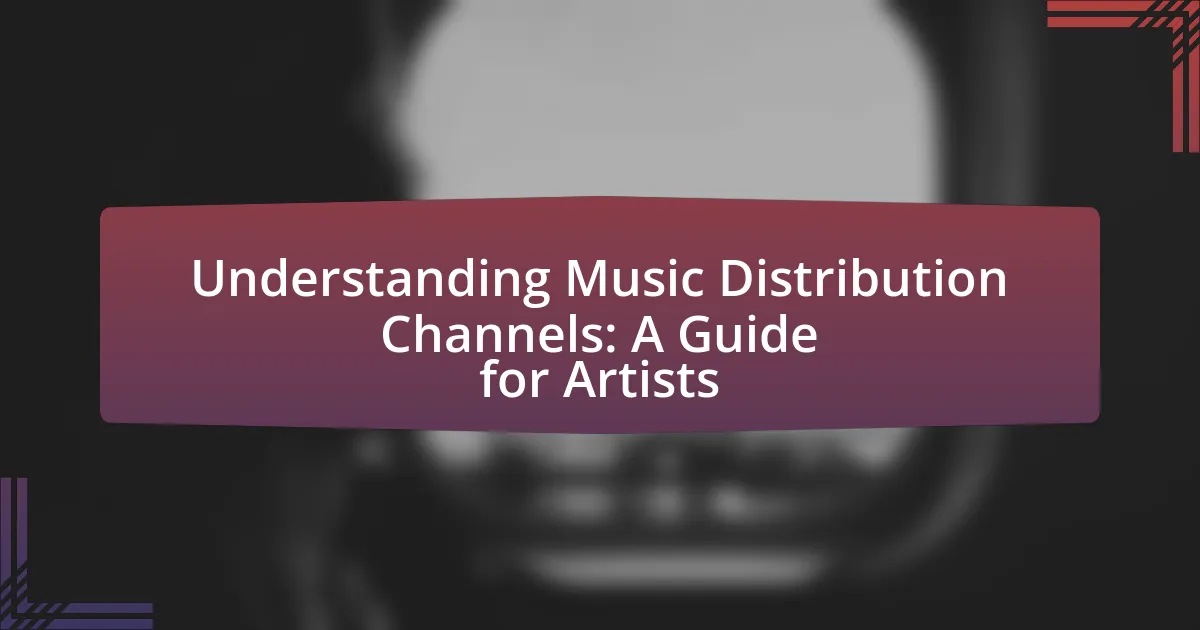Crafting a compelling biography for a music portfolio is essential for artists to effectively communicate their musical journey, achievements, and unique qualities. This article outlines the importance of a well-structured biography, detailing key elements such as personal background, influences, notable performances, and awards that enhance an artist’s credibility. It also discusses best practices for writing and presenting a biography across various platforms, emphasizing the role of storytelling and authenticity in engaging audiences. Additionally, the article provides practical steps for gathering information and avoiding common pitfalls, ensuring that musicians can create impactful narratives that resonate with fans and industry professionals alike.

What is a Compelling Biography in a Music Portfolio?
A compelling biography in a music portfolio is a concise narrative that highlights an artist’s musical journey, achievements, and unique qualities. This biography should include key information such as the artist’s background, influences, notable performances, and any awards or recognitions received. For instance, a biography that mentions specific albums released, collaborations with well-known artists, or performances at significant venues can effectively demonstrate the artist’s credibility and experience. By presenting this information in an engaging manner, the biography not only informs potential collaborators and audiences but also establishes the artist’s brand identity within the music industry.
Why is a biography important for musicians?
A biography is important for musicians because it provides a narrative that connects their personal and professional experiences, helping to establish their identity and brand. This narrative allows musicians to communicate their artistic journey, influences, and achievements, which can resonate with audiences and industry professionals. For instance, a well-crafted biography can highlight significant milestones, such as album releases or notable performances, thereby enhancing a musician’s credibility and appeal. Additionally, biographies serve as essential marketing tools, as they are often included in press kits, websites, and social media profiles, making it easier for fans and industry stakeholders to understand the musician’s background and artistry.
What role does a biography play in showcasing an artist’s identity?
A biography plays a crucial role in showcasing an artist’s identity by providing a narrative that encapsulates their personal history, influences, and artistic journey. This narrative helps to humanize the artist, allowing audiences to connect with their experiences and motivations. For instance, a well-crafted biography can highlight significant life events, such as formative experiences or challenges faced, which shape the artist’s creative output. Additionally, it can detail the artist’s musical influences and stylistic evolution, offering insights into their unique sound and vision. By presenting these elements, a biography not only informs but also engages potential fans, collaborators, and industry professionals, ultimately enhancing the artist’s public persona and marketability.
How can a biography influence audience perception?
A biography can significantly influence audience perception by shaping how individuals view an artist’s identity, experiences, and credibility. When a biography highlights key achievements, personal struggles, and unique attributes, it creates a narrative that resonates with the audience, fostering a connection and enhancing relatability. For instance, a well-crafted biography that details an artist’s journey from humble beginnings to success can evoke empathy and admiration, leading to a more favorable perception. Research indicates that narratives in biographies can enhance emotional engagement, which is crucial in the music industry where personal stories often drive fan loyalty and support.
What elements make a biography compelling?
A compelling biography includes authenticity, narrative structure, and emotional connection. Authenticity ensures that the biography reflects the true experiences and personality of the individual, which resonates with readers. A well-defined narrative structure organizes the life events in a coherent manner, often following a chronological or thematic approach, making it easier for readers to engage with the story. Emotional connection is achieved through relatable experiences and insights, allowing readers to empathize with the subject’s journey. These elements combined create a biography that captivates and maintains the reader’s interest, as evidenced by successful biographies like “The Diary of a Young Girl” by Anne Frank, which showcases authenticity and emotional depth, leading to its lasting impact.
What personal details should be included in a music biography?
A music biography should include personal details such as the artist’s full name, date of birth, place of origin, and musical influences. These elements provide context about the artist’s background and help establish their identity in the music industry. Additionally, including significant milestones, such as the start of their musical career, notable achievements, and collaborations, enhances the narrative. For instance, mentioning awards won or chart positions reached can substantiate the artist’s impact and credibility in the music scene.
How can storytelling enhance a musician’s biography?
Storytelling can enhance a musician’s biography by creating a deeper emotional connection with the audience. This connection is achieved through narratives that highlight personal experiences, struggles, and triumphs, making the musician’s journey relatable and engaging. For instance, a biography that includes anecdotes about the musician’s early influences or pivotal moments in their career can evoke empathy and interest, leading to a stronger bond with fans. Research indicates that stories are more memorable than facts alone; a study published in the journal “Psychological Science” found that narratives can significantly improve recall and engagement. Thus, incorporating storytelling into a musician’s biography not only enriches the content but also fosters a lasting impact on the audience.
How does a biography differ across various music genres?
A biography differs across various music genres primarily in its focus on genre-specific elements, influences, and achievements. For instance, a rock musician’s biography may emphasize live performances, band dynamics, and rebellious themes, while a classical musician’s biography often highlights formal training, compositions, and collaborations with orchestras. Additionally, hip-hop biographies frequently showcase lyrical prowess, cultural impact, and personal struggles, reflecting the genre’s roots in storytelling and social commentary. These distinctions are supported by the varying expectations of audiences within each genre, which shape how artists present their narratives and accomplishments.
What specific elements should be highlighted in a pop music biography?
A pop music biography should highlight key elements such as the artist’s background, musical influences, career milestones, notable achievements, and personal anecdotes. The background provides context about the artist’s origins and formative experiences, while musical influences showcase the styles and artists that shaped their sound. Career milestones include significant releases, collaborations, and performances that mark the artist’s journey. Notable achievements encompass awards, chart positions, and critical acclaim, which validate the artist’s impact in the industry. Personal anecdotes add depth and relatability, allowing fans to connect with the artist on a more intimate level. These elements collectively create a comprehensive narrative that captures the essence of the artist’s journey and contributions to pop music.
How should a biography for a classical musician be structured?
A biography for a classical musician should be structured chronologically, beginning with early life and education, followed by career milestones, notable performances, awards, and personal insights. This structure allows readers to understand the musician’s development and achievements in a clear and logical manner. For instance, detailing the musician’s formative years, such as training under renowned teachers or attending prestigious conservatories, establishes a foundation. Following this, highlighting significant performances, collaborations, and recordings showcases their professional journey. Including awards and recognitions adds credibility, while personal insights can humanize the biography, making it relatable. This approach not only informs but also engages the audience, providing a comprehensive view of the musician’s artistic identity.

How to Craft Your Music Biography Effectively?
To craft your music biography effectively, focus on highlighting your unique musical journey, achievements, and influences in a concise manner. Begin with a strong opening that captures your essence, such as your musical genre, notable performances, or collaborations. Include specific milestones, like album releases or awards, to establish credibility. For instance, mentioning that you have performed at major festivals or received critical acclaim can enhance your biography’s impact. Additionally, incorporate personal anecdotes that reflect your passion for music, as these can resonate with readers and create a connection. Ensure the biography is well-structured, with clear sections that guide the reader through your story, making it easy to follow and engaging.
What steps should you follow to write your biography?
To write your biography, follow these steps: first, outline your life events, focusing on significant milestones, achievements, and experiences relevant to your music career. Next, write a compelling introduction that captures your essence and musical journey. Then, detail your musical influences, education, and notable performances or collaborations. After that, include personal anecdotes that highlight your passion for music and your artistic vision. Finally, revise and edit your biography for clarity and conciseness, ensuring it reflects your unique voice and style. This structured approach helps create an engaging narrative that resonates with your audience.
How can you gather the necessary information for your biography?
To gather the necessary information for your biography, conduct thorough research through interviews, personal reflections, and archival materials. Interviews with family, friends, and colleagues provide firsthand accounts and insights into your life experiences, while personal reflections help articulate your thoughts and feelings about significant events. Archival materials, such as photographs, letters, and documents, offer concrete evidence of your journey and achievements. This multi-faceted approach ensures a comprehensive and accurate portrayal of your life, essential for crafting a compelling biography in your music portfolio.
What writing style is most effective for a music biography?
The most effective writing style for a music biography is a narrative style that combines storytelling with factual information. This approach engages readers by presenting the artist’s life and career in a compelling manner while ensuring accuracy through well-researched details. For instance, incorporating anecdotes, personal experiences, and significant milestones allows the biography to resonate emotionally with the audience, making it more relatable and memorable. Additionally, using a chronological structure helps to clearly outline the artist’s journey, providing context and depth to their achievements and challenges.
What common mistakes should you avoid when writing a biography?
When writing a biography, common mistakes to avoid include excessive length, lack of focus, and failure to verify facts. Excessive length can overwhelm readers, making it crucial to keep the biography concise and relevant. A lack of focus may lead to including irrelevant details that do not contribute to the subject’s narrative, which can dilute the impact of the biography. Additionally, failing to verify facts can result in inaccuracies that undermine credibility; for instance, misrepresenting dates or achievements can mislead readers and damage the subject’s reputation.
How can clichés undermine the impact of your biography?
Clichés can undermine the impact of your biography by making it sound generic and unoriginal, which diminishes the reader’s engagement. When a biography relies on overused phrases or ideas, it fails to convey the unique experiences and qualities that define the individual, leading to a lack of authenticity. For instance, phrases like “I always knew I wanted to be a musician” do not provide specific insights into the artist’s journey or motivations, resulting in a missed opportunity to connect with the audience on a deeper level. This lack of originality can cause potential fans or industry professionals to overlook the biography, as it does not stand out in a competitive field where distinctiveness is crucial for capturing attention.
What should you avoid including in your biography to maintain professionalism?
To maintain professionalism in your biography, you should avoid including personal anecdotes that are irrelevant to your professional achievements. Such anecdotes can detract from your credibility and focus, making it difficult for readers to take your professional qualifications seriously. For instance, mentioning unrelated hobbies or personal struggles can shift the attention away from your skills and accomplishments in the music industry, which are the primary focus of a professional biography.

What are the Best Practices for Presenting Your Biography?
The best practices for presenting your biography include being concise, highlighting key achievements, and tailoring the content to your audience. A concise biography, typically around 150-200 words, ensures that readers remain engaged. Highlighting key achievements, such as awards or notable performances, establishes credibility and showcases your expertise. Tailoring the content to your audience, whether industry professionals or fans, allows for a more personal connection. According to a study by the National Endowment for the Arts, artists who effectively communicate their background and accomplishments are more likely to attract opportunities and collaborations.
How should you format your biography for different platforms?
To format your biography for different platforms, tailor the length and style to suit each platform’s audience and purpose. For social media, keep it concise, ideally under 150 characters, focusing on key achievements and personality traits. On professional sites like LinkedIn, use a more detailed approach, including your career history, skills, and endorsements, typically around 300-500 words. For personal websites, you can provide a comprehensive biography, detailing your journey, influences, and artistic vision, often exceeding 500 words. This approach ensures that your biography resonates with the specific audience of each platform, enhancing engagement and connection.
What length is ideal for a music biography on social media?
The ideal length for a music biography on social media is between 150 to 300 words. This length allows for a concise yet informative overview of the artist’s background, achievements, and style, making it engaging for the audience. Research indicates that social media users prefer brief content that captures attention quickly, with studies showing that bios within this word count range tend to receive higher engagement rates.
How can you adapt your biography for press kits and websites?
To adapt your biography for press kits and websites, focus on tailoring the content to suit the specific audience and purpose of each platform. This involves highlighting relevant achievements, using concise language, and emphasizing your unique selling points. For instance, in a press kit, include notable performances, awards, and collaborations that enhance your credibility, while a website biography may benefit from a more personal narrative that connects with fans. Additionally, ensure that the tone aligns with the platform; a professional tone is suitable for press kits, whereas a more casual tone may resonate better on a personal website.
What tips can enhance the effectiveness of your biography?
To enhance the effectiveness of your biography, focus on clarity, authenticity, and relevance. Clarity ensures that your achievements and experiences are communicated in a straightforward manner, making it easy for readers to understand your journey. Authenticity allows your personality and unique voice to shine through, which can create a stronger connection with your audience. Relevance involves tailoring your biography to highlight experiences and skills that are pertinent to your music career, ensuring that the content resonates with industry professionals and fans alike. For instance, including specific milestones, such as awards or notable performances, can substantiate your claims and provide concrete evidence of your accomplishments.
How can you incorporate quotes or testimonials into your biography?
Incorporating quotes or testimonials into your biography can enhance credibility and provide a personal touch. To do this effectively, select impactful statements from industry professionals, collaborators, or fans that highlight your skills, achievements, or character. Position these quotes strategically within your biography, such as at the beginning to capture attention or interspersed throughout to reinforce key points. For example, a quote from a well-known artist praising your work can serve as a powerful endorsement, making your biography more compelling and relatable.
What role does updating your biography play in your music career?
Updating your biography plays a crucial role in a music career by ensuring that an artist’s public image reflects their current achievements and artistic direction. A well-maintained biography helps attract industry attention, as it provides promoters, labels, and fans with relevant information about recent projects, collaborations, and milestones. For instance, artists who update their biographies to include recent awards or notable performances can enhance their credibility and marketability, leading to increased opportunities for bookings and collaborations. This practice is supported by the fact that a dynamic biography can significantly influence an artist’s visibility in a competitive market, as it serves as a key marketing tool that communicates their evolving narrative and professional growth.
What resources can help you improve your biography writing skills?
Books on biography writing, such as “The Art of Biography” by Hermione Lee and “Writing Biography” by Nigel Hamilton, provide essential techniques and insights for improving biography writing skills. These resources cover narrative structure, character development, and research methods, which are crucial for crafting compelling biographies. Additionally, online courses from platforms like Coursera and MasterClass offer structured learning and expert guidance, enhancing practical skills through assignments and feedback. Engaging with writing workshops and critique groups can also provide valuable peer feedback, further refining biography writing abilities.
Which books or articles are recommended for writing compelling biographies?
“Writing Compelling Biographies” is effectively addressed by several key resources. Notable books include “The Art of Biography” by Hermione Lee, which provides insights into the nuances of biographical writing, and “Biographical Writing in the Modern World” by Richard Holmes, which explores contemporary approaches to biography. Additionally, “The Biography Book: A Reader’s Guide to Non-Fiction” by Michael E. McCullough offers a comprehensive overview of significant biographical works and techniques. Articles such as “How to Write a Biography” from The Writer’s Digest provide practical tips and frameworks for crafting engaging narratives. These resources collectively offer foundational knowledge and practical guidance for writing compelling biographies.
How can feedback from peers enhance your biography?
Feedback from peers can enhance your biography by providing diverse perspectives that highlight strengths and areas for improvement. Peers can offer insights into how your experiences resonate with others, ensuring that your biography effectively communicates your unique narrative. For instance, constructive criticism can help refine language, clarify achievements, and emphasize key moments that define your musical journey. Research indicates that peer feedback fosters collaborative learning, which can lead to more polished and engaging biographies, ultimately making them more appealing to audiences and industry professionals.





